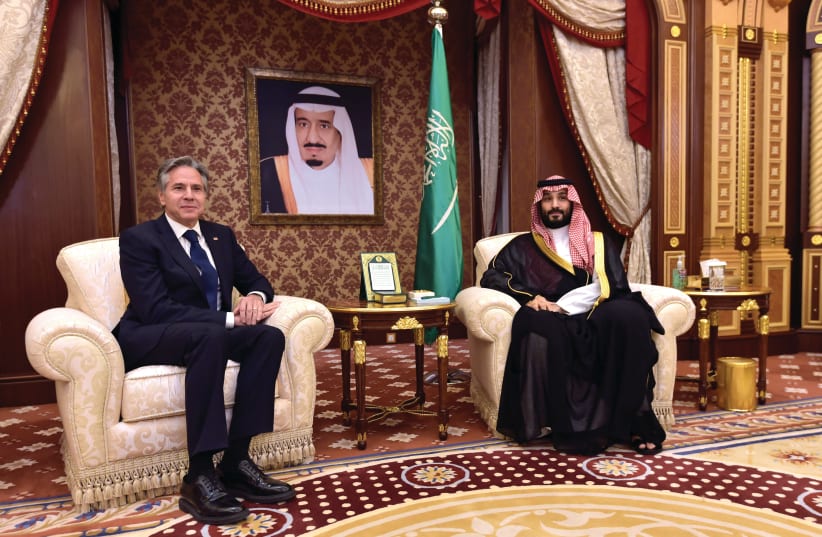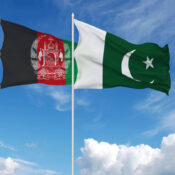
Saudi Arabia gives up on trying to get a US defense pact because of the standoff with Israel
Two Saudi and four Western sources told Reuters that Saudi Arabia has given up on an ambitious defense deal with the US in exchange for improving ties with Israel. Instead, the kingdom is now focusing on a more modest military cooperation agreement.
In order to finish a broad mutual security deal earlier this year, Riyadh changed its mind about the idea of a Palestinian state. It told Washington that a public promise from Israel to a two-state solution might be enough for the Gulf country to get along again.
But people in Saudi Arabia and the rest of the Middle East are very angry about Israel’s military actions in Gaza. Two Saudi and three Western sources say that Crown Prince Mohammed bin Salman has made it clear again that Israel will only be recognized if it takes real steps to create a Palestinian state.
Western officials say that Israeli Prime Minister Benjamin Netanyahu is still eager to normalize relations with the Saudi giant as a sign of wider acceptance in the Arab world and an important step in history.
But after the Hamas attacks on October 7, he meets strong resistance at home to making any concessions to the Palestinians. He also knows that any move toward statehood would cause his ruling coalition to fall apart, they said.
Sources say that Riyadh and Washington are hoping to sign a less ambitious defense deal before President Joe Biden leaves the White House in January. This is because both leaders are currently limited by their own domestic power bases.
Two-thirds of the U.S. Senate would have to agree to a full U.S.-Saudi treaty for it to go through. Six sources said this would not happen unless Riyadh accepts Israel.
As part of the pact that is currently being talked about, joint military drills and training would be expanded to deal with threats in the area, mostly from Iran. Sources say it would make it easier for U.S. and Saudi defense companies to work together, but there would be protections against working with China.
The deal would encourage Saudi Arabia to spend money on new technologies, especially defense for drones. The U.S. would be more present in Riyadh by providing training, supplies, and cyber security support. They may also send a Patriot missile company to improve missile defense and integrated deterrence.
In the event of a foreign attack, however, it would not be the type of mutual defense treaty that would force U.S. troops to guard the world’s largest oil exporter.
A think tank in Saudi Arabia called Abdelaziz al-Sagher said, “Saudi Arabia will get a security deal that will allow more military cooperation and sales of U.S. weapons, but not a defense treaty like that of Japan or South Korea as was first sought.”
WHAT TRUMP NEEDS TO DO
But things are even more difficult now that Donald Trump is about to move into the White House.
Trump is friendly with the Saudi crown prince, but his plan to end the conflict between Israel and the Palestinians doesn’t include any parts for Palestinian territory or authority.
Some Arab and Palestinian officials are worried that Trump and his son-in-law Jared Kushner, who worked on the “Deal of the Century” and is close with the crown prince, might be able to get him to back the plan in the end.
Diplomats say that how the prince balances Saudi goals with the changing international scene will be very important for both his leadership and the future of the peace process.
There are still a lot of problems that need to be solved before the U.S. government gives up on getting a deal on security promises before Biden leaves office in January. In Washington, someone who knew about the talks said there were reasons to doubt whether there was enough time to reach a deal.
A source said that U.S. officials are aware that the kingdom still wants to officially seal the deals it has been looking for, especially to get access to more advanced weapons. However, they don’t know if the kingdom would rather do this under Biden or wait for Trump.
The U.S. source said, “We continue to talk with the Saudis and have many ways to work together on the table.”
When asked about attempts to make a deal on U.S. security guarantees for Saudi Arabia, the White House National Security Council did not say anything.
When asked what Saudi Arabia thought about the idea of a Palestinian state, Netanyahu’s office wouldn’t say anything.
Saudi Arabia would get U.S. military security in return for recognizing Israel. This would change the Middle East by bringing together two countries that have been enemies for a long time and tying Riyadh to Washington at a time when China is moving into the area.
There would be less chance of another attack on the kingdom’s oil sites like the one in 2019 that both Riyadh and Washington said was done by Tehran. This would make the kingdom safer and protect it from threats from Iran and its Houthi supporters. Any part has been rejected by Iran.
A top Saudi official said the treaty was 95% finished, but Riyadh chose to talk about a different deal instead because the first one couldn’t happen without normalizing relations with Israel.
Two sources say that a smaller cooperation deal might be able to be signed without going through Congress before Biden leaves office, but it depends on how it is set up.
There were other problems that made it hard to reach an agreement on mutual defense.
Six sources said that the talks about civil nuclear cooperation did not move forward because Saudi Arabia would not sign the so-called 123 Agreement with the U.S. This agreement would have kept Riyadh from enriching uranium.
One Saudi source who was close to the talks told Reuters that Saudi complaints to stories about human rights were another point of disagreement.
“THE BIG PRIZE”
Diplomats say they don’t know what the crown prince would do if Trump brought up the deal he proposed in 2020 to end the conflict between Israel and the Palestinians. The Saudi government strongly supports the creation of a Palestinian state.
The plan is a big change in U.S. policy and international deals because it clearly sides with Israel and goes against the long-standing land-for-peace formula that has been used to negotiate in the past.
It recognizes Jerusalem as the “undivided capital of Israel” and lets Israel take over large parts of the occupied West Bank, such as Israeli settlements and the Jordan Valley. This means that the Palestinians can’t claim East Jerusalem as their capital, which is a key goal of their statehood goals and is also in line with U.N. resolutions.
Many people think that Trump’s plan is very bad for the two-state solution and Palestinian dreams of becoming a state because it makes Israeli annexations legal.
Officials from Saudi Arabia say that making a Palestinian state in line with past international agreements, with East Jerusalem as its capital, is still necessary for long-term peace and stability in the area.
They say that without it, the cycle of abuse will continue to put any regular relationships at risk.
A top Saudi official asked, “How can we imagine a region united if we don’t deal with the Palestinian issue?” “You can’t prevent the Palestinian right to self-determination.”
Crown Prince Mohammed called Israel’s military actions in Gaza “collective genocide” in his speech to an Arab and Islamic gathering in Riyadh this month. This was some of the sharpest criticism of Israel since the war in Gaza began.
Normalizing relations between Saudi Arabia and Israel might be looked at again in the future, officials said. This could happen after the Gaza war, or under a different Israeli government.
A Middle East expert at the London School of Economics named Fawaz Gerges said that Trump would use all of his power to make things normal between Saudi Arabia and Israel for the first time in history.
Gerges said, “King Salman is the big prize for Trump.”
“As to how normalisation could happen despite repeated Saudi leaders insistence they will not recognise Israel until a real path to a Palestinian state is set, Trump could promise a ceasefire in Gaza in return for normalisation and tentative promise to support a Palestinian state, without obliging Israel to make any real concessions to the Palestinians.”
All Categories
Tags
+13162306000
zoneyetu@yahoo.com


